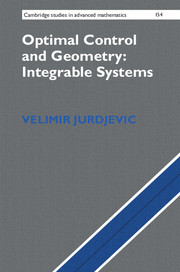Book contents
- Frontmatter
- Contents
- Acknowledgments
- Introduction
- Chapter 1 The Orbit Theorem and Lie determined systems
- Chapter 2 Control systems: accessibility and controllability
- Chapter 3 Lie groups and homogeneous spaces
- Chapter 4 Symplectic manifolds: Hamiltonian vector fields
- Chapter 5 Poisson manifolds, Lie algebras, and coadjoint orbits
- Chapter 6 Hamiltonians and optimality: the Maximum Principle
- Chapter 7 Hamiltonian view of classic geometry
- Chapter 8 Symmetric spaces and sub-Riemannian problems
- Chapter 9 Affine-quadratic problem
- Chapter 10 Cotangent bundles of homogeneous spaces as coadjoint orbits
- Chapter 11 Elliptic geodesic problem on the sphere
- Chapter 12 Rigid body and its generalizations
- Chapter 13 Isometry groups of space forms and affine systems: Kirchhoff's elastic problem
- Chapter 14 Kowalewski–Lyapunov criteria
- Chapter 15 Kirchhoff–Kowalewski equation
- Chapter 16 Elastic problems on symmetric spaces: the
- Chapter 17 The non-linear Schroedinger's equation and Heisenberg's magnetic equation–solitons
- References
- Index
Chapter 9 - Affine-quadratic problem
Published online by Cambridge University Press: 05 May 2016
- Frontmatter
- Contents
- Acknowledgments
- Introduction
- Chapter 1 The Orbit Theorem and Lie determined systems
- Chapter 2 Control systems: accessibility and controllability
- Chapter 3 Lie groups and homogeneous spaces
- Chapter 4 Symplectic manifolds: Hamiltonian vector fields
- Chapter 5 Poisson manifolds, Lie algebras, and coadjoint orbits
- Chapter 6 Hamiltonians and optimality: the Maximum Principle
- Chapter 7 Hamiltonian view of classic geometry
- Chapter 8 Symmetric spaces and sub-Riemannian problems
- Chapter 9 Affine-quadratic problem
- Chapter 10 Cotangent bundles of homogeneous spaces as coadjoint orbits
- Chapter 11 Elliptic geodesic problem on the sphere
- Chapter 12 Rigid body and its generalizations
- Chapter 13 Isometry groups of space forms and affine systems: Kirchhoff's elastic problem
- Chapter 14 Kowalewski–Lyapunov criteria
- Chapter 15 Kirchhoff–Kowalewski equation
- Chapter 16 Elastic problems on symmetric spaces: the
- Chapter 17 The non-linear Schroedinger's equation and Heisenberg's magnetic equation–solitons
- References
- Index
Summary
Let us now return to the symmetric Riemannian pairs (G,K) and the Cartan decompositions. In the previous chapter we investigated the relevance of the left-invariant distributions with values in p for the structure of G and the associated quotient space G/H. In particular, we showed that the controllability assumption singled out Lie group pairs (G,K) in which the Lie algebraic conditions of Cartan took the strong form, namely,
In this chapter we will consider complementary variational problems on G defined by a positive-definite quadratic form Q(u, v) in k and an element. More precisely, we will consider the left-invariant affine distributions D(g) = {g(A + X) : X ∈ k} defined by an element A ∈ p. Each affine distribution defines a natural control problem in G,
with control functions u(t) taking values in.
We will be interested in the conditions on A that guarantee that any two points of G can be connected by a solution of (9.1), and secondly, we will be interested in the solutions of (9.1) which transfer an initial point g0 to a given terminal point g1 for which the energy functional is minimal. We will refer to this problem as the affine-quadratic problem.
In what follows, we will use ⟨u, v⟩ to denote the negative of the Killing form Kl(u, v) = Tr(ad(u) ∈ ad(v)) for any u and v in g. Since the Killing form is negative-definite on, the restriction of ⟨, ⟩ to is positive-definite, and can be used to define a bi-invariant metric on. This metric will be used as a bench mark for the affine-quadratic problems. For that reason we will express the quadratic form Q(u, v) as ⟨Q(u), v⟩ for some self-adjoint linear mapping Q on k which satisfies ⟨Q(u), u ⟩> 0 for all u = 0 in k. Then, Q = I yields the negative of the Killing form, i.e., the bi-invariant metric on.
- Type
- Chapter
- Information
- Optimal Control and Geometry: Integrable Systems , pp. 147 - 166Publisher: Cambridge University PressPrint publication year: 2016

